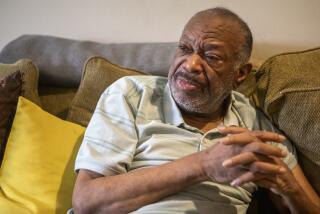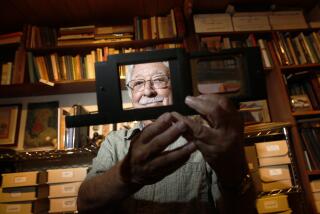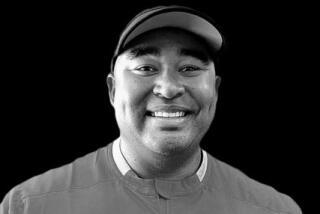Lowell Steward dies at 95; decorated WWII Tuskegee Airman
When Lowell Steward was a student at Santa Barbara State College, he and other members of the school’s basketball team decided to enlist in the Army Air Forces. The others were accepted.
“The powers-that-be seemed to be saying that Negroes couldn’t fly an airplane,” Steward told The Times in 1990. “They didn’t believe that Negroes had the mental capacity to do anything other than menial jobs. I had never touched an airplane, but that so incensed me that I said, ‘Hell, I know I can fly.’ ”
And so he did. After 10 months of being told to wait, Steward enlisted in a new World War II military unit — an organization created by the then-segregated armed forces to train African American pilots.
Steward, who flew more than 100 combat missions and received the Distinguished Flying Cross for his service with the famed Tuskegee Airmen, died of natural causes Wednesday in a Ventura hospital, said Ron Brewington, president of the Los Angeles chapter of Tuskegee Airmen Inc. Steward was 95.
After his military service, Steward futilely tried to buy a house in Los Angeles for himself and his young family. Rejected in several attempts because of his race, he studied for his real estate license while working as a railway baggage porter and went on to become one of the first black real estate brokers in Los Angeles County.
“He wanted to help his fellow brothers when they came back from the war just like him — with money in their pocket but no place to stay,” Steward’s son, Lowell Steward Jr., said Sunday. “That’s what he was really proud of: being instrumental in integrating Los Angeles to whatever degree he could.”
Steward, who bought a home in the Crenshaw district, worked as a broker and appraiser for 40 years until retiring and moving to Oxnard with his wife, Helen.
Born in Los Angeles on Feb. 25, 1919, Lowell Cedric Steward was the son of a railroad porter and a homemaker.
As a high school student, he was channeled into vocational instead of academic courses because of his race, his son said. A track star and basketball standout, Steward attended Los Angeles Junior College before his admission to Santa Barbara State College, the forerunner of UC Santa Barbara.
As captain of Santa Barbara’s basketball team, he led the way to an undefeated season in 1941, when the Gauchos made it to the National Assn. of Intercollegiate Basketball championship in Kansas City. Steward, the only black athlete on the team, was barred from competing at the arena and had to persuade his teammates not to walk out in sympathy.
“He had to go across the street and listen to the game on the radio,” his son said. “He told me he didn’t ever get over that.”
Enlisting in 1942 after receiving his B.A. in business, Steward was one of about 1,000 pilots trained at Tuskegee Army Air Field in Alabama, where the nurses, engineers, cooks, clerks and other personnel were also African American. Designated by government officials at the time as the “Tuskegee Military Experiment,” the effort has since come to be called the “Tuskegee Experience.”
Quarters were provided by the Tuskegee Institute, the school founded by educator Booker T. Washington. In a 1984 interview with Studs Terkel Steward said that organizers of the “experiment” were skeptical about its chances.
“As one of the officers in charge put it, if it doesn’t work out, it’ll be down South and nobody’ll see’em fail anyway,” Steward said. “We’ll give’em a chance. If they succeed, I guess it won’t hurt anything. If they fail, we’ll hush it up and nobody will know about it.”
In Europe, the 450 Tuskegee Airmen sent overseas developed a reputation for their combat skills. The fliers dubbed themselves the “Lonely Eagles” but were known to the Germans as the Schwartze Vogelmenschen — the Black Birdmen. They destroyed 260 German planes and damaged 148, sinking a Nazi destroyer and blowing apart hundreds of military vehicles. Sixty-six of the U.S. pilots were killed.
In 1944, Steward was sent to Italy and flew 143 bomber escort and strafing missions. In one encounter over Marseilles, an 18-inch hole was blown through one of his wings.
“It was flapping,” he told the Santa Barbara Independent in 2007. “I had to fly slow so the plane wouldn’t catapult.”
Steward and other Tuskegee Airmen received a Congressional Gold Medal from President George W. Bush in 2007.
In addition to his son, Lowell, Steward’s survivors include daughters Pamela Mills and Shelley Lambert; 11 grandchildren; and 11 great-grandchildren. His wife Helen, whom he met in college, died in 2004.
Funeral services for Steward will be at 10 a.m. Monday at the Angelus Funeral Home in Los Angeles.
Twitter: @schawkins
More to Read
Start your day right
Sign up for Essential California for the L.A. Times biggest news, features and recommendations in your inbox six days a week.
You may occasionally receive promotional content from the Los Angeles Times.







